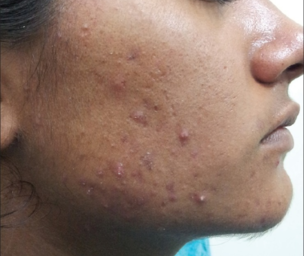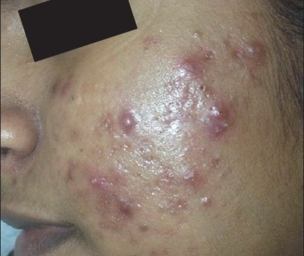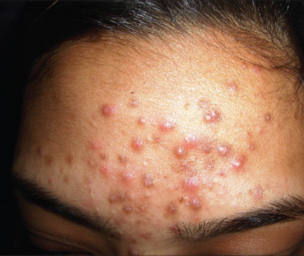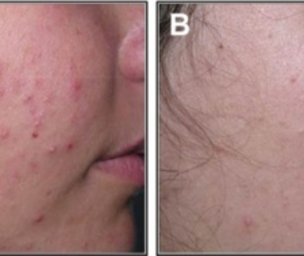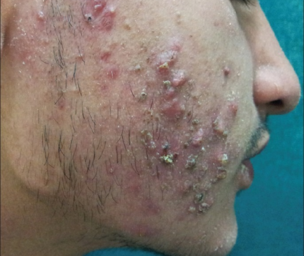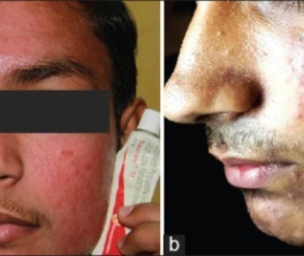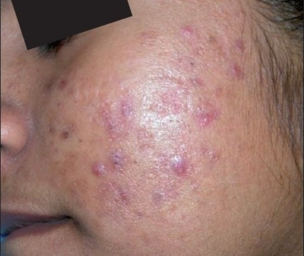What Is Butt Acne?
Causes of Butt Acne

Butt acne refers to an outbreak of pimples or blackheads on the buttocks. It’s often caused by folliculitis and carbuncles. The condition usually occurs due to hormonal changes taking place in the body. Moreover, other underlying conditions might be responsible for its occurrence.
What's the Difference Between Acne and Butt Acne?
Acne and butt acne are both painful skin infections most commonly caused by bacteria. While they sound similar, these two skin conditions are totally different.
What is acne?
Acne, also called acne vulgaris, is a chronic skin condition characterized by the presence of oily skin with blackheads or whiteheads spread over the face, neck, back, chest and shoulders. It is a common problem among teenagers due to hormonal changes during puberty. However, people of any age may develop.
Acne is a disease of multifactorial origin. Genetics, hormone level, and the presence of certain bacterium all play a contributory role.
What is butt acne?
Butt acne is different compared to the acne that may appear on the face. It is, in fact, another type of skin infection which occurs due to bacteria, fungus, yeast, or irritation to the hair follicles.
Additionally, butt acne may also develop due to a more severe infection called carbuncle. When small boils under the skin clump together, a carbuncle is formed. Unlike folliculitis, carbuncle causes more painful butt acne.
The differences
- Causative microorganism: Propionibacterium acnes (P. acnes) is a major cause of acne. Staphylococcus aureus (Staph), a type of bacterium is most often associated with butt acne. P. acnes is a slow-growing gram-positive bacterium found on the skin surface. In addition to acne, it may also cause some infections of the eyes. Staph is also a gram positive bacteria but more common in the respiratory tract. It may also be present in the skin. Normally harmless, it can cause a range of diseases including skin abscess, sinusitis, meningitis, sepsis, endocarditis and others.
- Transmissibility: It is difficult to tell whether or not butt acne is contagious. Because transmissibility varies depending on the type of the causative microorganism, you should always make sure you do not share your towel or any other item with another person. Butt acne due to staph or virus is highly contagious. However, there is every chance that you may acquire or spread fungus-associated butt acne. On the other hand, regular acne is not transmissible. There is no way you can get infected with P. acnes by acquiring it from others. In fact, you already carry this bacteria but in a dormant state. Unless activated by a number of other factors, P. acnes cannot cause acne.
- Risk factors: There is no doubt non-specific risk factors may be common to both these conditions. But when considering the specific risk factors, there are substantial differences. The occurrence of butt acne may be influenced by chronic diseases like diabetes, kidney and liver disorders or any disease/condition that brings the immune function down. Oily skin type, genetics, and changes in hormone levels are the most influential factors for the occurrence of acne.
- Treatments: Many medications may treat both these conditions. They include benzoyl peroxide, tretinoin, steroids, and antibiotics. Antifungal agents have also proven to be successful in treating some cases of butt acne. On the other hand, acne treatments may include oral contraceptives and antiandrogens.
- Location: Butt acne is confined to the areas around the buttocks while acne may affect your face, neck, chest, back, and shoulders.
Causes of Butt Acne
Folliculitis is the inflammation or swelling of the hair follicles, which can develop on any parts of your body. Butt acne can occur due to ingrown hairs, friction from tight clothing, or bacterial infections. Folliculitis affects the surface of the skin and is often itchy, scratchy, and painful.
Carbuncles also referred to as boils cause severe pain. They occur when folliculitis becomes deeper infections or forms pus-filled knots underneath the skin surface. Having acne on your face and torso doesn’t necessarily imply that you’re likely to get carbuncles or folliculitis on the buttocks. Nevertheless, butt acne can result in detrimental scarring if not managed appropriately. Several factors contribute heavily to the outbreak of buttock acne. This include:
- Excessive perspiration triggered by tight fitting clothes or extreme heat, So if you happen to reside in a hot and tropical zone, wearing tight fitting clothes is bound to cause an outbreak of butt acne
- Certain soaps or detergents that cause severe skin irritation. Check with your doctor regarding substances you may be allergic to and if possible asks him to do a full panel allergy test as this can help you find out if you would be allergic to a particular product or in this case, soap
- Allergic reactions to scented products or perfumes. If you are allergic to inhalants and certain perfumes, then chances are that you can develop butt acne
- Presence of folliculitis or carbuncles as a result of excessive sweating and irritation. Again, this is on account of environmental factors which can cause excessive sweating along with irritation
Treatment Options for Butt Acne
Treatment varies depending on the precise cause of your condition. You could either be suffering from carbuncles, folliculitis, or both. Normally, folliculitis eruptions disappear naturally without any medication. However, if the symptoms last longer than usual, your dermatologist may recommend a combination of treatment products to clear up your skin, often topical antibiotics, which are applied to the affected areas of the skin and benzoyl peroxide. Such products have effective antibacterial properties that help in drying out the affected skin. Moreover they should help alleviate some, if not all the symptoms and even cause the acne to disappear.
For carbuncles, medication or treatment is quite intensive since carbuncles go deeper. Your doctor might prescribe an oral antibiotic to combat the infection. In addition, he/she may have to prick the boil in a sterile setting in order to drain the accumulated pus. Thereafter, the skin will be covered using a bandage. Don’t try draining carbuncles on your own, you might contract more infections.
This is vital, do not attempt to drain a carbuncle on your own since you may end up exacerbating the situation to the point that you end up with more health complications than what you had initially. Your doctor would study the carbuncle, use a local anesthetic and sterilized needle to drain the carbuncle completely. So make sure that you follow through on this and that you consult your doctor for helping you with the carbuncle.
Butt acne is not same as pimples that appear on the face, chest, or back. Normally, these pimples on the buttocks disappear on their own. In case they do not, you should consider the following treatments to get rid of butt acne.
You have to remember that the medications that you may take to treat butt acne can vary depending on the underlying cause. There are two known causes of butt acne. They are folliculitis and carbuncle.
And moreover, you might be allergic to some and may develop a mild allergic reaction when using one or another tropical lotion or ointment. So make sure you check it out with your doctor and additionally you can also do a test at your end, to see if you are allergic or not. You take the ointment and dab a small part on your elbow and check to see how your skin reacts to the same. And if your skin does not break out into hives and rashes, then it is safe to use the ointment.
In addition, the severity of the condition also determines which treatment you should consider. Severe cases need prescription medications while mild cases may respond to over-the-counter medications, commonly known as butt acne clearing lotion.
So make an appointment with the dermatologist and find out just how severe your case is so that you can get the right treatment for your current condition.
Treatment of butt acne caused by folliculitis
Butt acne caused by folliculitis is not very severe in nature and tends to improve with topical treatments.
If the pimples on the buttocks break out suddenly and are more painful, it’s most likely to be classified as acute butt acne.
Generally, these acute outbreaks respond to antibiotics and exfoliating creams that contain alpha-hydroxy acids such as lactic acid. The former medications kill the bacteria responsible for butt acne while the latter help to remove the dead, old dead skin cells.
Individuals with chronic butt acne may also achieve results by using these topical medications. However, their effectiveness varies significantly in the chronic cases. And in case of severe cases, you would need much more than a tropical lotion and you would need antibiotics along with other medications to help resolve your butt acne.
Benzoyl Peroxide lotion
This is an antibacterial formulation that you can apply locally on butt acne. You do not need your doctor’s prescription to buy this product. However, make sure you buy it from a reputed pharmacy.
The active ingredient in this butt acne clearing lotion, benzoyl peroxide, is also available in the form of soap, bar, solution, cream, pad, wash, and gel.
However, considering a larger area that butt acne affects, many prefer using the lotion. Any form of benzoyl peroxide is as effective as the rest. Make sure to check and see if you are allergic to benzoyl peroxide, and once you confirm that you can use it safely, go ahead and apply it on the affected area.
Precautions to take
- Benzoyl peroxide causes excessive dryness, peeling, or flaking of the skin. Therefore, you should not rub your skin after washing the surface. Instead, you should pat the skin dry and avoid using medicated soaps. A mild cleanser is the most suitable in such conditions. While there may be a temptation to scratch at it, you need to avoid doing so as the skin would be extremely dry due to the lotion.
- Apply the lotion on a small portion of the affected areas and see if you develop an allergy. If you observe no serious or troublesome effects, you can use it over the larger affected areas.
- Do not use this butt acne clearing lotion near your eyes. If your condition does not improve or worsen after a few days of use, consult your doctor. It is important that you check in with your doctor regularly and keep him briefed about all the medications you are using to help you treat your butt acne.
- If you have sunburned or open skin wounds, you should not use this product over these areas. Using the lotion over open wounds can cause you to experience a burning sensation. If you do have open wounds and even small ones, do not use the lotion on it.
Tretinoin
Topical preparations of tretinoin are available with or without your doctor’s prescription. You can get liquid, cream or gel forms of this medication.
Chemically, it is a derivative of Vitamin A and helps to control butt acne. It works by facilitating exfoliation of the affected areas.
Precautions to take
This is a more potent medication and you need to exercise certain precautions to avoid serious side effects.
- Make sure you follow the instructions on the medication leaflet properly. If you have any questions, talk to your family doctor or pharmacist. Your doctor would be the perfect person for you to contact for queries regarding tretinoin.
- Tretinoin renders the skin sensitive to UV rays, so you should avoid exposing the treated part of the body to sunlight. If you need to, make sure you use an effective sunscreen product. In addition, apply it at bedtime and do not rub. It is important that you avoid rubbing the affected area and even scratching at it. Use soft tissues to gently pat the surface post application. And apply just before going to bed, as that should help to facilitate faster treatment.
- Avoid using any medicated soap while using this medication. While companies can advertise their medicated soap as being allergen free, the truth is that all soaps contain allergen of one kind or other. So avoid using any new brand of soaps, especially medicated ones.
- Do not use it together with any skin product that causes dryness such as benzoyl peroxide lotion or alcohol-containing products. Do read the directions again and do not use this lotion in combination with any other.
- Inform your doctor if you are pregnant, planning to become pregnant, or breastfeeding. It is important that you keep your doctor informed of all the facts pertinent to your case. You would need to inform the doctor whether you have plans to get pregnant, or are pregnant or breast feeding an infant at this moment. All these facts can have a bearing on the medications prescribed to help you deal with butt acne.
- Remember Tretinoin can worsen butt acne during the first week of starting the treatment. If your condition becomes excessive during this period, stop using the product and consult your doctor.
Alpha-Hydroxy Acid (AHA)
Non-prescription products containing low concentrations of AHAs such as lactic acid may be useful to treat butt acne.
Like Tretinoin, butt acne clearing lotion containing AHA also improves the symptoms by removing the layer of dead cells from the skin surface. Additionally, they also diminish scars, improve skin appearance, and make the skin smooth.
You can also get these medically-active acids from natural sources such as sour milk, citrus fruits, and sugarcane. However, using the natural forms may not always be suitable while treating butt acne.
Precautions to take
- Consult your dermatologist if you are using products that contain more than 10% AHA. Not all over-the-counter products have labels indicating the percent of AHA in them. Therefore, it is better to use only those products that have clearly mentioned the concentration.
- You may have skin irritation, redness, swelling and color changes while using these products. Many of these side effects will go away after a few days of use.
Oral Antibiotics to Get Rid of Butt Acne
Before you think of using an antibiotic to treat butt acne, you should consult your doctor to understand whether or not you really need it. Mild cases and folliculitis-associated butt acne often improve on their own, so usually there is not a need for antibiotic medication.
Antibiotics are powerful medications. You should never self-medicate with oral antibiotics. Using antibiotics without proper reason is a major cause of antibiotic resistance. When a microorganism becomes resistant, you become less responsive to the common antibiotics.
You should take oral antibiotics to treat butt acne only when symptoms are severe and non-responsive to topical treatments. Moreover it is important that you consult your doctor and get him to prescribe medication rather than opt for OTC antibiotics. Most of these antibiotics come with side effects and prolonged usage would soon result in the organism becoming antibiotic resistant.
Treatment of butt acne caused by carbuncle
Butt acne that occurs due to carbuncle has more severe symptoms, since the infection affects the deeper tissues. Typically, these cases are better managed by oral antibiotics. Carbuncle is also known as staph skin infection.
Notably, if the infection is serious with an accumulation of a large amount of pus, drainage may be necessary along with the antibiotics.
You should never pierce or attempt to drain the pus at home. Doing so can cause other infections. So always get your carbuncle drained at the clinic rather than doing the deed by yourself at home. This will only result in you developing additional health complications as a result of your procedure.
When do you need oral antibiotics to treat butt acne?
Oral antibiotic therapy may not be necessary in all the cases of butt acne due to carbuncle.
However, there are certain conditions which necessitate use:
- Symptoms that last for more than 14 days, so if your symptoms have lasted for all of two weeks, then make an appointment with your doctor and get him to prescribe some antibiotics
- Persistent and/or relapsing nature of the carbuncle, you need to bring this to the attention of your doctor for effective treatment
- Fever accompanying the infection, if you are running a temperature while having butt acne, you need to highlight the same to your physician so that he can recommend an effective regimen of treatment for your condition.
- Another infection at the same time or later, if you are concurrently suffering from another infection then you have to inform your doctor regarding the same. In fact, you need to share your complete medical history with your doctor and the current ailments you are suffering from, etc.
- Extreme discomfort or unbearable pain, if you are in extreme pain and discomfort, then you need to meet up with your doctor so that he can suggest alternative therapies and even prescribe antibiotics for the same
- Diagnosis of any chronic systemic disease like diabetes, having a chronic disease like diabetes can impair your ability to withstand carbuncles, so your doctor would probably prescribe a few antibiotics.
- Compromised immunity due to disease or medications, since you have a compromised immune system as a result of other health issues, you need to bring this to the attention of your doctor so that he can treat you with the right medication.
Which oral antibiotics are helpful in treating butt acne?
The Centers for Disease Control and Prevention (CDC) recommends all the clinicians to consider identification of the causative microorganism. This involves analysis of the pus drained from the carbuncle.
Your doctor may prescribe a combination of oral antibiotics like flucloxacillin with cephalosporin. Experts recommend different practices for the prescription of oral antibiotics to treat butt acne.
Some experts prefer to use other antibiotics such as doxycycline, rifampin, trimethoprim-sulfamethoxazole combination, or clindamycin.
In essence, the selection of any specific antibiotic/combination is based on clinical experience and the identification of the causative bacteria.
What should you know before using oral antibiotics to treat butt acne?
- You should take the full course of the antibiotic and follow other instructions accordingly. Read up more on the antibiotic talk to your doctor and educate yourself of the various risks and side effects associated with this drug.
- Learn about the potential interactions of the antibiotic with food, other drugs, and supplements. All antibiotics may react in some form or manner with other substances, so make it a point to talk to your doctor regarding this and find out whether this antibiotic may react with the other medication you have been taking so far.
- Do not miss any of the doses. If you miss a dose of your antibiotic, do not take double doses and follow the dosing schedule. This is very important, granted that there may be times when you may have forgotten to take your dosage, so take care to ensure that you do not miss out on it. And having missed out on one of your dosages does not mean that you get to double back and make up it
- If you develop any severe side effects or allergic reactions, discontinue the drug and seek immediate medical help.
- Store the antibiotic in a cool and dry place away from direct sunlight.
Prevention of Butt Acne
It isn’t always possible to prevent the development of carbuncles or folliculitis, but the following precautions can be taken to reduce its risks:
• Always wear loose clothing - tight clothing can trigger severe skin irritation that leads to detrimental folliculitis.
• Work closely with your doctor - to put any serious health conditions under control. Otherwise, your body will find it difficult to fight off dangerous infections.
• Regularly wash your skin with a benzoyl peroxide cleanser - this ingredient will help you get rid of folliculitis because it dries up the dead skin.
• Unclog skin pores using salicylic pads - do you want an acne-free butt? Prevent prospect developments by unblocking your skin pores a few times every week using a pad soaked in salicylic acid.
• Take a shower after every sweat session - sitting around with your workout clothes can increase your risks for butt acne. It’s healthy to shower right after work so as to prevent bacterial infections. Be certain to use a sonic cleansing brush, loofah, or puff to remove any dead skin cells, sweat, or bacteria that might be sitting on your skin.
If it happens that you contract folliculitis, ensure that you promptly get it under control by adopting proper management and treatment plans.
The Bottom Line
It’s common to think that both acne and butt acne are the same. However, understanding the important differences will help you manage both conditions more effectively.
There has been a long-standing misconception that acne increases the risk of butt acne. However, this too is not true. Neither of these conditions increases the risk of another.
The most important difference is that butt acne is contagious and regular acne is not. Many cases of butt acne, as well as acne, go away on their own. However, if they persist or make you feverish, you should talk to your doctor immediately.












